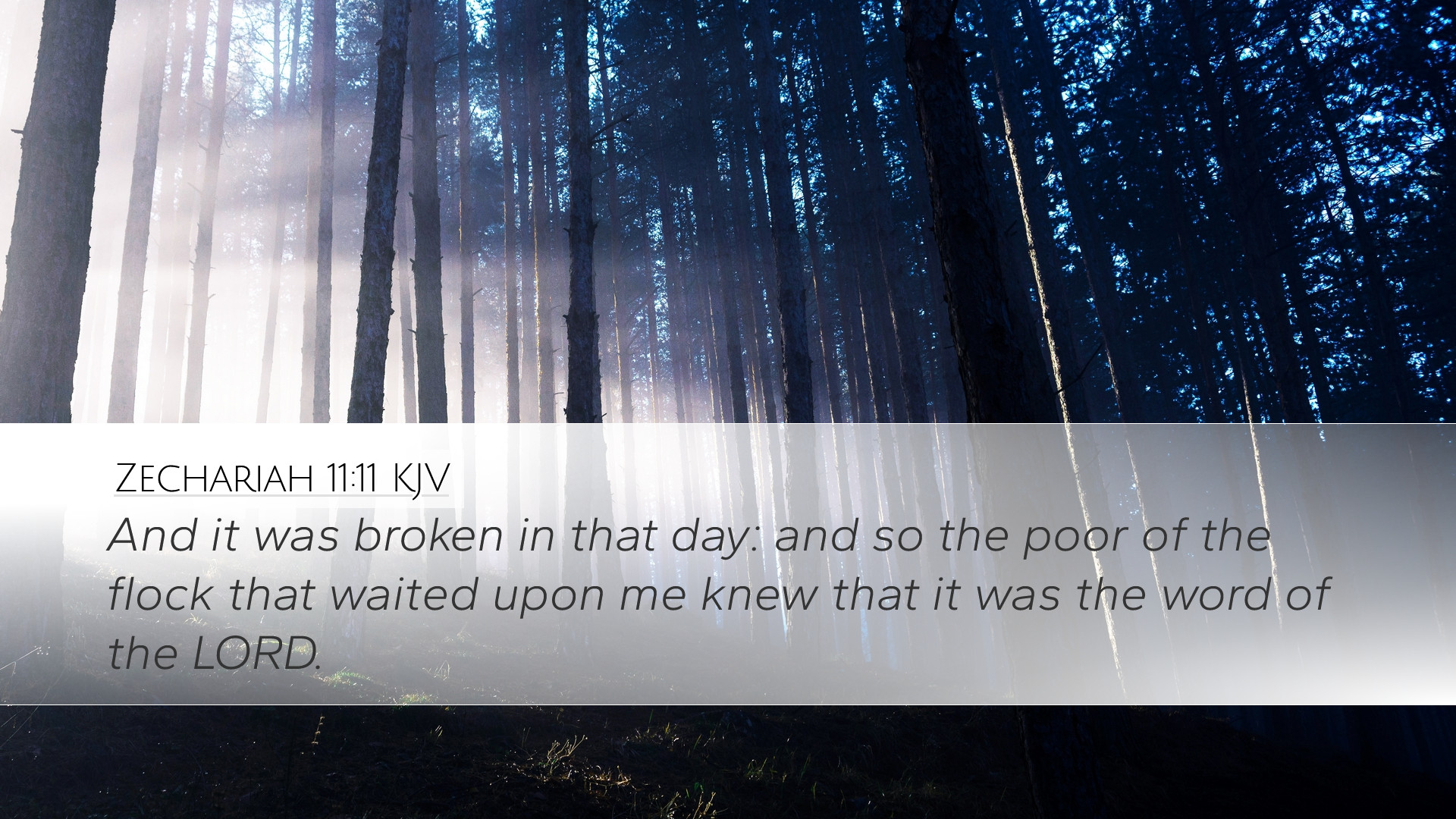Old Testament
Genesis Exodus Leviticus Numbers Deuteronomy Joshua Judges Ruth 1 Samuel 2 Samuel 1 Kings 2 Kings 1 Chronicles 2 Chronicles Ezra Nehemiah Esther Job Psalms Proverbs Ecclesiastes Song of Solomon Isaiah Jeremiah Lamentations Ezekiel Daniel Hosea Joel Amos Obadiah Jonah Micah Nahum Habakkuk Zephaniah Haggai Zechariah MalachiZechariah 11:11
Zechariah 11:11 KJV
And it was broken in that day: and so the poor of the flock that waited upon me knew that it was the word of the LORD.
Zechariah 11:11 Bible Commentary
Commentary on Zechariah 11:11
Verse: "And it was broken in that day: and so the poor of the flock that waited upon me knew that it was the word of the Lord."
Introduction
The verse Zechariah 11:11 is a profound text within the prophetic writings of Zechariah. This commentary seeks to explore the implications of this verse through insights from public domain commentaries, particularly those of Matthew Henry, Albert Barnes, and Adam Clarke. As we delve into the context and meaning, we aim to provide a resource meaningful to pastors, students, theologians, and scholars alike.
Contextual Background
Zechariah prophesied during a time of restoration for Israel. His ministry came after the Babylonian Exile, addressing a people who were seeking to rebuild their identity and faith. In this chapter, Zechariah engages in symbolic actions that represent the state of the nation and God's relationship with His people. His reference to the broken staff symbolizes the loss of God's favor and protection over Israel.
Interpretative Insights
-
Matthew Henry's Analysis:
Henry emphasizes the significance of the phrase "it was broken in that day," linking it to the moment of loss for the shepherds and the flock. He interprets this breaking as indicative of God's judgment against the leaders of Israel, who failed to guide the people properly. The breaking represents a necessary severance that allows for a realization of dependence on God's word. The poor of the flock are highlighted as those who remain faithful and are acutely aware of the significance of God's message.
-
Albert Barnes’ Exposition:
Barnes refers to the historical context of the verse, suggesting it reflects the desolation of the Jewish leadership. He notes that the "poor of the flock" are metaphorically understood as the faithful remnant who recognize the consequences of their leaders' failure. He stresses that the acknowledgment of "the word of the Lord" illustrates a pivotal moment wherein the faithful can discern God's intentions amidst the turmoil they face. This recognition serves as an invitation to return to divine guidance.
-
Adam Clarke’s Commentary:
Clarke provides a more theological reflection highlighting the prophetic nature of Zechariah's words. He posits that the "day" referenced signifies a future time characterized by both judgment and hope. His view stresses the importance of the covenant relationship between God and His people, indicating that the breaking of the staff entails not just judgment, but a turning point leading to eventual hope and restoration. Clarke further alludes to Jesus as the ultimate shepherd whose ministry resonates with the themes expressed in Zechariah.
Theological Reflections
This verse invites serious theological reflection regarding the nature of leadership within the Church and the weight of responsibility that comes with such roles. The shepherd metaphor is crucial, reinforcing the idea that leaders ought to guide their flocks with wisdom and divine insight. The breaking of the staff suggests an opportunity for reevaluation and reform within leadership structures, echoing the need for leaders today to adhere to the teachings and guidance that culminate in Christ.
Practical Applications
-
For Pastors:
This passage serves as a reminder of the importance of being attuned to God’s Word. It emphasizes the responsibility of spiritual leaders to remain faithful to their calling and to lead their congregations in truth.
-
For Students:
Students of the Bible are encouraged to engage with prophetic literature thoughtfully. Zechariah demonstrates the significance of understanding context and symbolism in Scripture, fostering deeper insight into God’s unfolding plan.
-
For Theologians:
Theologians may explore the typological connections found in this verse, particularly in relation to Christ as the Good Shepherd. The analysis of the dual themes of judgment and hope provides fertile ground for further study in the framework of redemptive history.
Conclusion
Zechariah 11:11 encapsulates a critical moment in Israel's history and serves as a poignant reminder of the need for faithful leadership rooted in God's Word. This commentary, informed by insights from esteemed commentators, urges us to reflect on our own roles within the Church and the importance of drawing guidance from Scripture. As we contemplate the implications of this verse, let it inspire our commitment to faithfully follow the shepherding voice of Christ in our ministries and lives.


